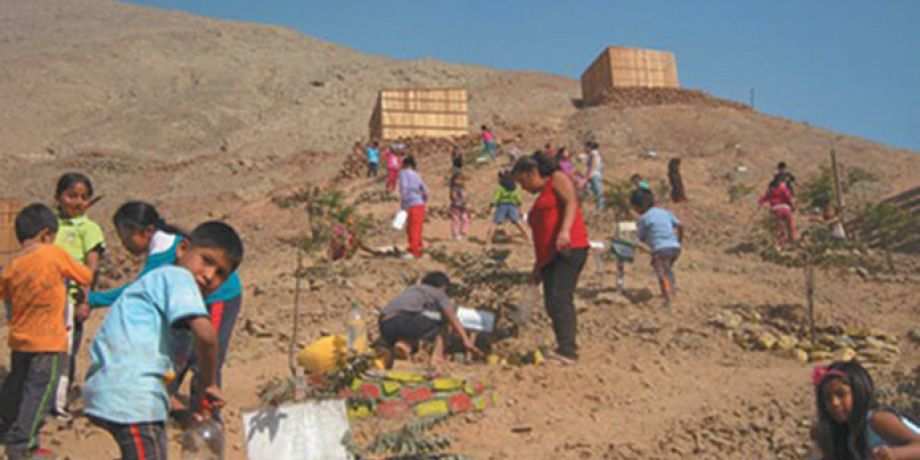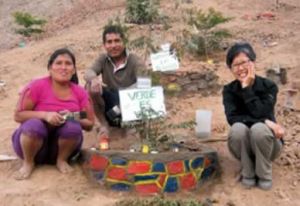
Growing a Community
I got off the minibus at the last stop on the hillside in Huaycan, on the outskirts of Lima, Peru. The road ended here so I walked on the unpaved sandy track up the hill, past the shacks that seemed to sprout on the bare slopes. Sand, dust, dirt. Not a blade of grass. Not a flower. The only color was the ragged clothes of the children who followed me, full of curiosity as they laughed at my funny accent. They were lovely, and they were dirt poor.

After many more bus journeys, meetings with the parents, listening to them and seeing the children, I discovered that their most pressing need was to have a place where their children could do their homework after school. As it was, they had minimal space and no light in their small shacks. I often saw children trying to do their homework on the side of the road before darkness fell. How could we help them?
After talking things over with my community and receiving donations from generous benefactors, we built a fine brick Center in this bleak area, the St. Columban Center. And now, every day up to 70 school boys and girls come here to study after school. Not only do they have space and light but they are helped by the three teachers we employ. What a difference it has made to the whole community here!
Among the children who come are three little boys, sons of Josephina who came to Lima from the Sierra, the high valleys of the Andes mountains. She married a man who turned out to be a bully. A quiet woman, with a low self-image, she was no match for her tormenter.
After years of mistreatment, both physical and mental, she left home one day with her three small sons. Her understanding sister-in-law let her use a dilapidated wooden shack some miles away from her “home.” The boys and their mother did their best in this wretched place, since it being infinitely preferable to living with a tyrant. Helped by some of her poor neighbors, Josephina and her sons somehow managed to exist. Despite, or maybe because of, her own lack of education, Josephina was firm in her determination that her sons would learn their books. “Don’t be like me,” she’d say to them. She made sure they went to school every day, no excuses–and they loved it. It was actually through her sons that I came to know this very reserved woman.
Our Center is located in one of the poorest areas in Huaycan. The first question we ask the children when they come to study is, “Did you have lunch today?” Many, sadly, go hungry so at least we are able to give them some nourishment every day. We also put on various helpful programs for them, and we reach out to the parents also. Over the years the community has developed and what a joy it is to see how, given the opportunity, the people flourish.
One evening I visited Josephina; her living arrangements shocked me. But this very dignified woman wanted no charity. Sitting in that shack, I sensed her reluctance to engage with a stranger, though she had met me at the Center and was appreciative of the help it was to her sons. Eventually she admitted that their most pressing needs were water containers and bedding. We were able to supply those items, thanks again to generous benefactors. Josephina came to the Center to help with the cleaning, and over many months we persuaded her to come to various activities so that she got to know other mothers and feel more at home.
Later on we were able to purchase a small bit of land nearby, and we built a little house for Josephina and her boys. How she smiled and smiled that day! Now at last she felt really safe and though she never fully shed that low selfimage, she became much more hopeful, especially for her sons. They are her joy.
The area around the Center is bleak beyond words. One day I went to the Area County Office and asked them to give us 100 trees. Well, they were delighted that the local people at the Center would be so interested. Not only did they give us 60 trees, but they sent us a horticulturist to teach us how to plant and care for these saplings. How enthusiastic we all were!
The children promised to water their trees regularly and care for them. And they do–each one diligently bringing their bottle of water and carefully pouring it on the arid ground a few times every week. Every green leaf is as joyfully welcomed as a little baby! Not only do the growing trees nourish our spirit, but the children and their parents are learning the importance of caring for the earth in many little ways.
In order to encourage the children and their parents to come to the Center we use many small strategies. One of the most successful is the paper “money” we give to the mothers (you almost never see fathers) according to the points they accumulate. For example, so many points for making sure their children come to study, for attending various workshops or meetings, for helping keep the place spotless, seeing to the meals, and so on. A chart on the wall keeps the record straight, and both children and parents take an avid interest in the points earned. These are then exchanged for the paper “money.”
When Christmas comes we have a bumper market where they can use their paper “money” to buy a variety of goods, mainly food and clothing. It’s a win-win situation and lots of fun. The community celebration and the good will and laughter that day must surely delight the Lord himself!
In some ways I think our Center is like one of those saplings; it needs to be cared for, watered with love and patience, nourished with hope. In small ways we are growing “into Christ” and seeing His Kingdom come here among us. Every day I thank God for this mission, for the blessings for the poor, for the children who are the hope of the future. And I thank Him too for the many, many people whose generous spirit enables us to be here. You, too, share in the blessings of our unstinting God.
Columban Sr. Martina Kim has been on mission in Peru for the last eight years.